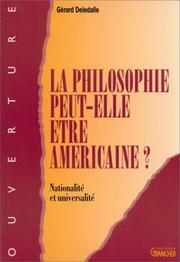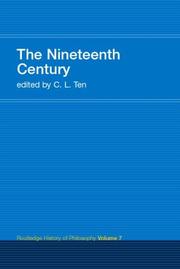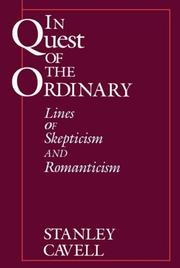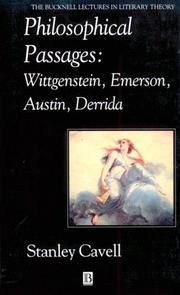| Listing 1 - 8 of 8 |
Sort by
|
Book
ISBN: 0631117814 9780631117810 Year: 1980 Publisher: Oxford : Blackwell,
Abstract | Keywords | Export | Availability | Bookmark
 Loading...
Loading...Choose an application
- Reference Manager
- EndNote
- RefWorks (Direct export to RefWorks)

ISBN: 273390485X 9782733904855 Year: 1995 Publisher: Paris: Grancher,
Abstract | Keywords | Export | Availability | Bookmark
 Loading...
Loading...Choose an application
- Reference Manager
- EndNote
- RefWorks (Direct export to RefWorks)
Philosophy, American --- Pragmatism. --- -Philosophy, American --- -Pragmatism --- Idealism --- Knowledge, Theory of --- Philosophy --- Philosophy, Modern --- Positivism --- Realism --- Utilitarianism --- Experience --- Reality --- Truth --- American philosophy --- Pragmatism --- Philosophy, American - 19th century. --- Philosophy, American - 20th century. --- Philosophie --- Pragmatisme (philosophie)
Book
ISBN: 0300020392 9780300020397 Year: 1977 Publisher: New Haven (Conn.): Yale university press,
Abstract | Keywords | Export | Availability | Bookmark
 Loading...
Loading...Choose an application
- Reference Manager
- EndNote
- RefWorks (Direct export to RefWorks)
Philosophy, American --- Harvard University --- -Philosophy, American --- -American philosophy --- Garvardskiĭ universitet --- Ha-fo ta hsüeh --- President and Fellows of Harvard College --- Harvard Üniversitesi --- Universidad de Harvard --- Dānishgāh-i Hārvārd --- University in Cambridge (Cambridge, Mass.) --- Harvard College (1636-1780) --- -Harvard University --- Harvard University. --- Hafo da xue --- Гарвардский университет --- 哈佛大學 --- 哈佛大学 --- Philosophy, American - 19th century --- Philosophy, American - 20th century

ISBN: 0415308798 0415060036 9780415060035 Year: 1994 Volume: 7 Publisher: London: Routledge,
Abstract | Keywords | Export | Availability | Bookmark
 Loading...
Loading...Choose an application
- Reference Manager
- EndNote
- RefWorks (Direct export to RefWorks)
European philosophy --- Europese filosofie --- Filosofie [Europese ] --- Philosophie européenne --- Philosophy [European ] --- 1 "18" --- Philosophy, Modern --- -Philosophy, European --- Philosophy, American --- -American philosophy --- Modern philosophy --- Filosofie:--19de eeuw --- -Filosofie:--19de eeuw --- 1 "18" Filosofie:--19de eeuw --- -European philosophy --- American philosophy --- History of philosophy --- anno 1800-1899 --- Philosophy, European. --- Philosophie --- Philosophie américaine --- Philosophie européenne --- Philosophie américaine --- Philosophy, European --- Philosophy [Modern ] --- 19th century --- Philosophy [American ] --- Philosophy, American - - 19th century --- Philosophy, Modern - 19th century --- -Philosophy, American
Book
ISBN: 9780823234707 9780823234721 9780823287062 0823234703 0823287068 082323472X 0823240762 0823249239 0823283089 Year: 2011 Publisher: New York: Fordham university press,
Abstract | Keywords | Export | Availability | Bookmark
 Loading...
Loading...Choose an application
- Reference Manager
- EndNote
- RefWorks (Direct export to RefWorks)
This is the first book to consider John Dewey's early philosophy on its own terms and to explicate its key ideas. It does so through the fullest treatment to date of his youthful masterwork, the Psychology. This fuller treatment reveals that the received view, which sees Dewey's early philosophy as unimportant in its own right, is deeply mistaken. In fact, Dewey's early philosophy amounts to an important new form of idealism. More specifically, Dewey's idealism contains a new logic of rupture, which allows us to achieve four things:- A focus on discontinuity that challenges all naturalistic views, including Dewey's own later view;- A space of critical resistance to events that is at the same time the source of ideals;- A faith in the development of ideals that challenges pessimists like Schopenhauer and Nietzsche; and- A non-traditional reading of Hegel that invites comparison with cutting-edge Continental philosophers, such as Adorno, Derrida, and Zizek, and even goes beyond them in its systematic approach;In making these discoveries, the author forges a new link between American and European philosophy, showing how they share similar insights and concerns. He also provides an original assessment of Dewey's relationship to his teacher, George Sylvester Morris, and to other important thinkers of the day, giving us a fresh picture of John Dewey, the man and the philosopher, in the early years of his career. Readers will find a wide range of topics discussed, from Dewey's early reflections on Kant and Hegel to the nature of beauty, courage, sympathy, hatred, love, and even death and despair. This is a book for anyone interested in the thought of John Dewey, American pragmatism, Continental Philosophy, or a new idealism appearing on the scene.
Dewey, John, --- Tu-wei, --- Tu-wei, Yüeh-han, --- Dyui, --- Dʹi︠u︡i, Dzhon, --- Dyuʼi, G'on, --- Дьюи, Джон, --- ديوى، جون، --- 杜威, --- Philosophical anthropology --- Theory of knowledge --- Dewey, John --- Dīvīy, Jān, --- ديويي، جان --- Philosophy, American --- Dīwʼī, Jān, --- Dīwiʼī, Jān, --- ديوئى، جان --- Diyūʼī, Jān, --- Dyūwi, Jon, --- Dyūi, Jon, --- デューウィジョン, --- デューイジョン, --- ジョン・デューウィ, --- ジョン・デューイ, --- Philosophy, American - 19th century --- Dewey, John, - 1859-1952
Book
ISBN: 9780198709374 9780199231201 0199231206 Year: 2013 Publisher: Oxford: Oxford university press,
Abstract | Keywords | Export | Availability | Bookmark
 Loading...
Loading...Choose an application
- Reference Manager
- EndNote
- RefWorks (Direct export to RefWorks)
Cheryl Misak presents a history of the great American philosophical tradition of pragmatism, from its inception in the Metaphysical Club of the 1870s to the present day. She identifies two dominant lines of thought in the tradition: the first begins with Charles S. Peirce and Chauncey Wright and continues through to Lewis, Quine, and Sellars; the other begins with William James and continues through to Dewey and Rorty. This ambitious new account identifies the connections between traditional American pragmatism and twentieth-century Anglo-American philosophy, and links pragmatism to major positions in the recent history of philosophy, such as logical empiricism. Misak argues that the most defensible version of pragmatism must be seen and recovered as an important part of the analytic tradition.
#KVHA:American Studies --- #KVHA:Filosofie Verenigde Staten --- #KVHA:Pragmatiek Verenigde Staten --- History of philosophy --- Pragmatics --- Philosophy of science --- anno 1800-1999 --- anno 2000-2099 --- United States --- Pragmatism --- Philosophy, American --- #KVHA:Filosofie; Verenigde Staten --- #KVHA:Pragmatiek; Verenigde Staten --- Idealism --- Knowledge, Theory of --- Philosophy --- Philosophy, Modern --- Positivism --- Realism --- Utilitarianism --- Experience --- Reality --- Truth --- Philosophy, American - 19th century --- Philosophy, American - 20th century --- Philosophy, American - 21st century --- United States of America

ISBN: 0226098184 9780226098180 Year: 1994 Publisher: Chicago (Ill.): University of Chicago press,
Abstract | Keywords | Export | Availability | Bookmark
 Loading...
Loading...Choose an application
- Reference Manager
- EndNote
- RefWorks (Direct export to RefWorks)
Skepticism --- American literature --- Philosophy in literature --- Philosophy, American --- Romanticism --- English literature --- History and criticism --- Theory, etc. --- -Philosophy in literature --- -Romanticism --- -Scepticism --- Unbelief --- Agnosticism --- Belief and doubt --- Free thought --- Pseudo-romanticism --- Romanticism in literature --- Aesthetics --- Fiction --- Literary movements --- British literature --- Inklings (Group of writers) --- Nonsense Club (Group of writers) --- Order of the Fancy (Group of writers) --- American philosophy --- Agrarians (Group of writers) --- -Theory, etc --- -British literature --- American literature - 19th century - History and criticism - Theory, etc. --- Philosophy, American - 19th century --- English literature - History and criticism - Theory, etc. --- Scepticism --- -History and criticism

ISBN: 0631192719 0631192697 9780631192695 9780631192718 Year: 1995 Volume: 12 Publisher: Oxford: Blackwell,
Abstract | Keywords | Export | Availability | Bookmark
 Loading...
Loading...Choose an application
- Reference Manager
- EndNote
- RefWorks (Direct export to RefWorks)
Emerson, Ralph Waldo --- Austin, J.L. --- Emerson, Ralph Waldo, --- Austin, J. L. --- Criticism --- Literature --- Philosophy --- Philosophy, American --- Philosophy, Modern --- Mental philosophy --- Humanities --- Literature and philosophy --- Philosophy and literature --- Evaluation of literature --- Literary criticism --- Rhetoric --- Aesthetics --- Theory --- Technique --- Evaluation --- Derrida, Jacques. --- Wittgenstein, Ludwig, --- Wei-tʻe-ken-ssu-tʻan, --- Wei-tʻe-ken-ssu-tʻan, Lu-te-wei-hsi, --- Wittgenstein, L. --- Vitgenshteĭn, L., --- Wei-ken-ssu-tʻan, --- Pitʻŭgensyutʻain, --- Vitgenshteĭn, Li︠u︡dvig, --- Weitegenshitan, --- Wittgenstein, Ludovicus, --- Vitgenshtaĭn, Ludvig, --- ויטגנשטיין, לודוויג --- 维特根斯坦, --- Imarsana, Rāfa Vālḍō, --- Emerson, R. W. --- Emerson, Waldo, --- Emerson, R. Waldo --- Ėmerson, Ralʹf Uoldo, --- Ai-mo-sheng, --- Emarsan̲, --- אמרסון, רלף ולדו, --- עמערסון, ראלף וואלדא, --- Austin, John Langshaw, --- Austin, John, --- Philosophy. --- Derrida, Jacques --- Wittgenstein, Ludwig --- Criticism. --- Derrida, Jacques, --- Derrida, J. --- Derida, Žak --- Derrida, Jackes --- Derrida, Zhak --- Deridah, Z'aḳ --- Deridā, Jāka --- Dirīdā, Jāk --- Деррида, Жак --- דרידה, ז'אק --- Philosophy [American ] --- 19th century --- Philosophy [Modern ] --- 20th century --- Austin, John Langshaw --- Wittgenstein, Ludwig Josef Johann, --- Philosophy, American - 19th century. --- Philosophy, Modern - 20th century. --- Literature - Philosophy. --- Wittgenstein, Ludwig, - 1889-1951. --- Emerson, Ralph Waldo, - 1803-1882 - Philosophy. --- Austin, J. L. - (John Langshaw), - 1911-1960. --- Derrida, Jacques, - 1930-2004 --- Emerson, Ralph Waldo, - 1803-1882
| Listing 1 - 8 of 8 |
Sort by
|

 Search
Search Feedback
Feedback About UniCat
About UniCat  Help
Help News
News